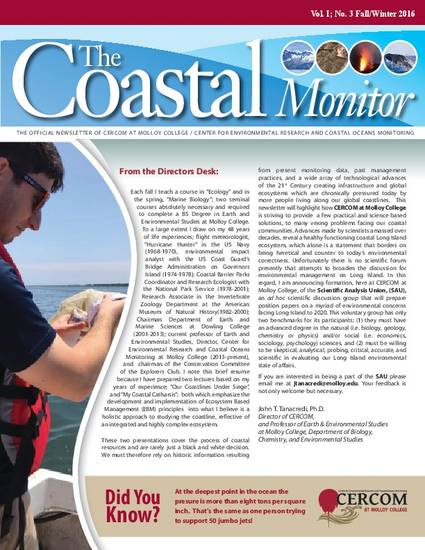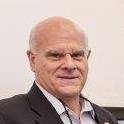
Each fall I teach a course in “Ecology” and in the spring, “Marine Biology”; two seminal courses absolutely necessary and required to complete a BS Degree in Earth and Environmental Studies at Molloy College. To a large extent I draw on my 48 years of life experiences; flight meteorologist, “Hurricane Hunter” in the US Navy (1968-1970), environmental impact analyst with the US Coast Guard’s Bridge Administration on Governors Island (1974-1978); Coastal Barrier Parks Coordinator and Research Ecologist with the National Park Service (1978-2001); Research Associate in the Invertebrate Zoology Department at the American Museum of Natural History(1982-2000); Chairman Department of Earth and Marine Sciences at Dowling College (2001-2013); current professor of Earth and Environmental Studies, Director, Center for Environmental Research and Coastal Oceans Monitoring at Molloy College (2013-present), and chairman of the Conservation Committee of the Explorers Club. I note this brief resume because I have prepared two lectures based on my years of experience; “Our Coastlines Under Siege”, and “My Coastal Catharsis”; both which emphasize the development and implementation of Ecosystem Based Management (EBM) principles into what I believe is a holistic approach to studying the coastline, reflective of an integrated and highly complex ecosystem. These two presentations cover the process of coastal resources and are rarely just a black and white decision. We must therefore rely on historic information resulting from present monitoring data, past management practices, and a wide array of technological advances of the 21st Century creating infrastructure and global ecosystems which are chronically pressured today by more people living along our global coastlines. This newsletter will highlight how CERCOM at Molloy College is striving to provide a few practical and science based solutions, to many vexing problems facing our coastal communities. Advances made by scientists amassed over decades, reveal a healthy functioning coastal Long Island ecosystem, which alone is a statement that borders on being heretical and counter to today’s environmental correctness. Unfortunately there is no scientific forum presently that attempts to broaden the discussion for environmental management on Long Island. In this regard, I am announcing formation, here at CERCOM at Molloy College, of the Scientific Analysis Union, (SAU), an ad hoc scientific discussion group that will prepare position papers on a myriad of environmental concerns facing Long Island to 2020. This voluntary group has only two benchmarks for its participants; (1) they must have an advanced degree in the natural (i.e. biology, geology, chemistry or physics) and/or social (i.e. economics, sociology, psychology) sciences, and (2) must be willing to be skeptical, analytical, probing, critical, accurate, and scientific in evaluating our Long Island environmental state of affairs.
Available at: http://works.bepress.com/john-tanacredi/24/
